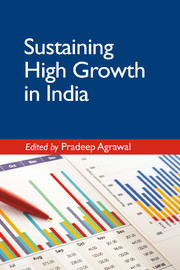Book contents
- Frontmatter
- Contents
- List of Tables
- List of Graphs and Maps
- Preface
- Introduction
- Section 1 Ensuring Macroeconomic Stability for Sustaining High Growth Rates
- 1 Propagation Mechanisms of Inflation in India: An Empirical Investigation
- 2 Managing Food Price Inflation in India: Demand Projections and Supply Considerations
- Section 2 Promoting Industrial Development for Sustaining High Growth Rates
- Section 3 The International Economic Issues and Sustaining High Growth
- Section 4 Infrastructure Bottlenecks to Sustaining High Growth
- Section 5 Some Socio-political Issues in Sustaining High Growth
- List of Contributors
- Obituary
- Index
1 - Propagation Mechanisms of Inflation in India: An Empirical Investigation
from Section 1 - Ensuring Macroeconomic Stability for Sustaining High Growth Rates
Published online by Cambridge University Press: 08 February 2018
- Frontmatter
- Contents
- List of Tables
- List of Graphs and Maps
- Preface
- Introduction
- Section 1 Ensuring Macroeconomic Stability for Sustaining High Growth Rates
- 1 Propagation Mechanisms of Inflation in India: An Empirical Investigation
- 2 Managing Food Price Inflation in India: Demand Projections and Supply Considerations
- Section 2 Promoting Industrial Development for Sustaining High Growth Rates
- Section 3 The International Economic Issues and Sustaining High Growth
- Section 4 Infrastructure Bottlenecks to Sustaining High Growth
- Section 5 Some Socio-political Issues in Sustaining High Growth
- List of Contributors
- Obituary
- Index
Summary
INTRODUCTION
During 2007–2014, India had higher trend inflation and lower trend growth together with fluctuations. Sustaining higher growth requires that inflation comes down. But, optimal policy to address inflation depends on whether the primary cause was excess demand or primary or persistent supply shocks. This chapter first explores this question, and then measures the possible contribution of a wage-price spiral to the persistence in supply shocks. Finally, it analyzes the effect of governance failures on food price inflation.
Data on inflation components show multiple primary supply shocks in the period. Rigorous estimates of the share of aggregate demand and supply shocks in inflation using a Structural Vector Auto Regression (SVAR) model also gives multiple supply shocks. Supply shocks were persistently high only for a brief period over 2010–2011. Demand shocks were often negative. The response of wages to food prices is primarily among mechanisms that propagate the relative price changes that constitute primary supply shocks. The nominal exchange rate also affects food prices and the cost of intermediate imports such as oil.
Growth in real wages for rural unskilled male labourers was often negative before September 2007, but became positive after that. Although the output growth rates fell, real wages rose sharply. Nominal wage growth far exceeded that in the relevant Consumer Price Index (CPI). Real wage growth peaked at 12.5 per cent in 2012 m1. As these affects a majority of the work force, we need to test whether the growth in rural wages was due to the factors specific to that time or to those that are likely to persist. How much did this growth contribute to the persistence of inflation?
In addition to the economic factors, such as large numbers of unskilled labour, social norms influence subsistence wages. Food constitutes a large share of the rural consumption basket; hence, food inflation, above a threshold level, may have raised the socially accepted minimum nominal wage. Increasing national wealth and standard of living also have a demonstration effect. Social programmes initiated by the government, such as Mahatma Gandhi National Rural Employment Guarantee Scheme (MGNREGS) may have reflected, as well as raised, social norms of ‘fair’ wages. Rural nonfarm activities, especially construction and inter-state migration, raised labour demand and bargaining power.
- Type
- Chapter
- Information
- Sustaining High Growth in India , pp. 27 - 54Publisher: Cambridge University PressPrint publication year: 2017



